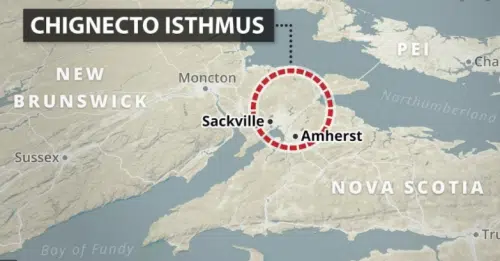Maritime politicians continue to push Ottawa to take full responsibility for fixing the Chignecto Isthmus.
New Brunswick Premier Blaine Higgs and Nova Scotia Public Works Minister Kim Masland appeared before a Senate committee Wednesday evening.
The committee is studying a bill by New Brunswick Sen. Jim Quinn that aims to bring the corridor, located along the New Brunswick-Nova Scotia border, under sole federal jurisdiction.
“The isthmus is integral to national and international trade. As storms become more severe due to climate change, the risk of a failure in the dyke system grows with each passing year,” Higgs told the committee.
A network of dykes and aboiteaux originally installed in the late 1600s currently protects communities, infrastructure, private lands and natural resources.
But rising sea levels and frequent severe weather events threaten the stretch of land, which is considered a vital transportation link.
An estimated $35 billion worth of trade flows across the corridor each year by road and rail.
“It cannot be overstated that without the isthmus, there will be serious challenges to the food supply chain. The goods that pass through it quite literally keep food on the shelves and feed people,” said Masland.
“This is not a matter of it, it is a matter of when something is going to happen.”
Proposed fixes include raising existing dikes, building new ones, or raising the dikes and installing steel walls at select locations.
However, the repairs will not come cheap. The latest estimate from July said it could cost as much as $650 million.
Ottawa has said it would pay for half of the work, but the premiers of New Brunswick and Nova Scotia said the feds should foot the entire bill.
Higgs said the two provinces have begun work to secure and repair the dyke system as they await the outcome of a constitutional challenge over who exactly should pay.
“We are proceeding with the work because it needs to be done. We can’t afford to have this vital transport and telecommunication link fail for any reason. That would be catastrophic for our region and for the country,” he added.






